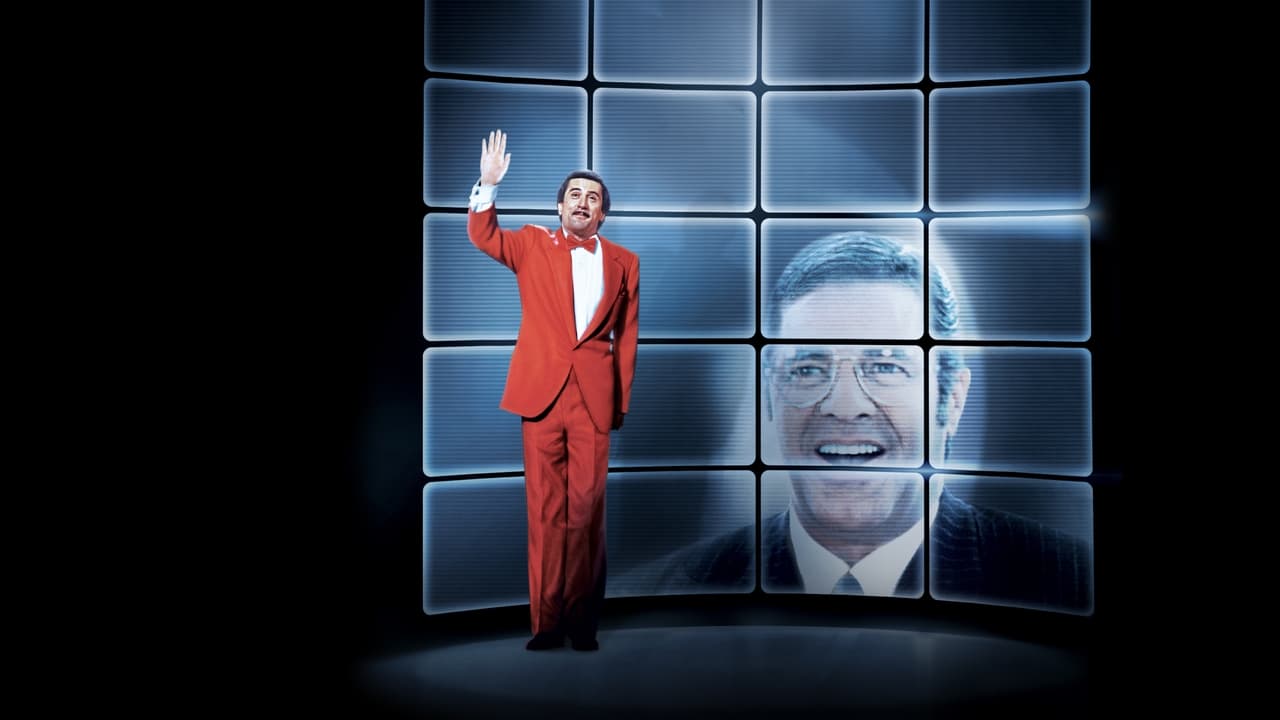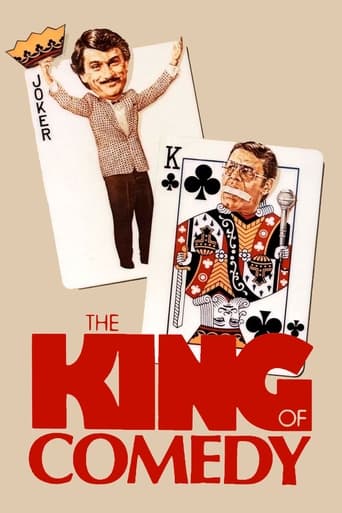

An absolute ridiculous farce. It's a good thing that Robert De Niro stuck to dramatic acting for most of his career.Of course, it was unusual to see Jerry Lewis in a rather serious part and he came through nicely as the kidnapped victim.The picture tried to bring out what the American people will accept as success, no matter how preposterous and asinine.De Niro comes across as a real nuisance as he sets out to literally hound the Lewis character to recognize him. Ignored at every turn, he resorts to the ultimate kidnapping and is able to go on television with his ridiculous monologue.Inane, that's really foolish.
... View MoreA great movie about television late night celebrity that stays totally & brutally under control & within the small screen context of both its subject & medium. Achingly crafted by Scorsese with DeNiro conquering both stand up & talk show personality plus an epic, transcendent performance by the late great Jerry Lewis. Lewis' performance is one for the ages! I've always enjoyed his comedy, but it was expected--even the $ two billion bucks he raised for MD Research. He did it. It's a fact.This movie deserves every consideration as a beyond honest portrayal of America's The Medium is the Message. Brilliant! Jerry Lewis will never die because of it & his honest personal accomplished portrayal. God Bless.
... View MoreThis movie made me feel uncomfortable for most of its duration... and that's a compliment! The main character's cringe inducing self humiliation makes you want to look away, but at the same time you hope maybe he might catch a break. This movie comments on the issues of celebrity worship and fame seeking, which I think is probably even more prevalent in today's society than in 1982. With the advent of the internet, social media, youtube... almost anyone can get their 15 minutes of fame, and they don't even have to kidnap a talk show host! They just need to flip a bottle or stand very still for an extended period of time.... Anyway, I very much enjoyed this movie. It has its funny moments, but with a sense of unease and tension running through them.8/10...but that's just like, my opinion, man# Of Times Watched: Once
... View MoreIt may be heresy to say but this may be perhaps De Niro's finest performance. The sympathy that he evokes is the bedrock on which The King of Comedy is able to be more than just a satirical stab at the celebrity culture that seems even more prevalent now. Why this works is because his Rupert Pupkin has a sort of fake pleasantness about him that allows him to worm his way under and past regulations that would bar people like Travis Bickle, for example. De Niro has this quality in Taxi Driver too, but here it seems even more pathetically earnest because there is no real threat of violence or predatory obsessiveness. He smiles a little too often, he eases and reassures, and maintains respectable boundaries as much he can, even though inside he must be jumping out of his skin. It's such a thin line to tread between the boundaries of uncomfortableness, but Pupkin is less a guy you want to get away from immediately and more a guy that you hope will leave you alone if you just do what he wants for now. Problem is, he is persistent. Scorsese has added a few little touches here and there to emphasis the disillusionment of Pupkin. The backgrounds are dim and flat, much like those cardboard cut-outs he converse with and his life when not dipping his head into fantasy, and if you look closely and pay enough attention you will actually spot extras in the distance staring intently at Pupkin himself. No doubt this is a manifestation of his dreams and does lend further credence to those who the ending is all in his head. The switching between the two realities does not happen with any real indication, further blurring the boundaries. In one instance an imaginary conversation between him and Jerry Lewis is shot in the conventional shot-reverse-shot style, only Pupkin in his eager modesty is home along in his mother's basement rather than in the lavish restaurant. Later Scorsese slowly pulls out to reveal the grimy emptiness of the room (I recall a similar shot in Glengarry Glen Ross). Actually compared to his companion Matha who also obsesses over Jerry Lewis Pupkin is rather sane in some segments. The line is tread ever so carefully. We see, in his repeated attempts at wooing the bartender Rita, that he is not nearly as socially inept as we expect him to be. Scorsese dangles a line for the audience and Rita, slowly lulling us into a little bit of false sense of security, charming us with lines that target Rita's loneliness, and then caps it all off with a tiny little transgression, his beaming sense of pride at having his own autograph as the top prize in his collection. Rita has only a small part, but is extremely well written. We sense that even as she sees Pupkin's eccentricities and breathes a sign of relief at him declining the offer for coffee she is still a lonely bundle of low self esteem and on some nights a small-time charmer like Pupkin just might do. If anything, he is at least courteous and respectful to her, which is why he is so easily swept up into his daytrip lie. The way she shrivels up in embarrassment having been so stupid to believe his fantasies in Lewis' home is perfect. And at the very bottom of the loneliness ladder, below even these two, is the nutcase Masha. In her few appearances she is manically screaming and obsessing over Jerry Lewis like there is no other meaning in her life. And it's true. In that quiet, faux-intimate scene, she has finally landed the man of her dreams, and conventional stories tell her that she needs to dress up and prepare a candlelit dinner (complete with a tied up guest). This is the only real opportunity for her to actually talk, and she responses by opening up the floodgates and releasing a myriad of childhood and mental problems that we would never have considered. Her vulnerability is so obvious that it leads to Lewis easily persuading her to untie him. And then just before he escapes, he cruelly slaps her down despite her never really posing a threat to him. It's the sort of celebrity lie that Scorsese tries to attack; that glittery, affable funny-man who becomes a pointed, harsh critic off-screen. So it does seem apt that his dismissal of Pupkin would mean that his appearance on the show is not the train-wreck we expect. It's good, even, for a couple of light chuckles. We can see he really belongs on the stage with his body language, gestures and timing (the assistant was right about this - the flip-side is his laughable timing on the kidnapping cue cards). The routine is a perfect blend of comedy and melancholy - for Pupkin his whole life was leading up to this 5 minute moment of fame where he was on top of it all, and it will never be as good again. Scorsese holds back on the moments right after we see the clip - he does not ever linger on any jovial audience, hysterical shrieking or applause, the surprised TV executives, or even the look of admiration from Rita. All in all it's a little sad. If only Jerry Lewis hadn't immediately written off Pupkin as a lunatic (even if he might deserve it - the firing squad joke was a hit after all). If only we didn't marginalise people like Masha and just sat down and listened to them for a while. But that's not the way showbiz works.
... View More